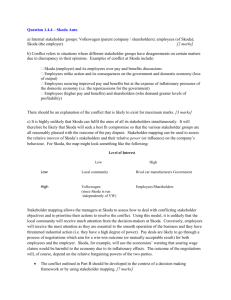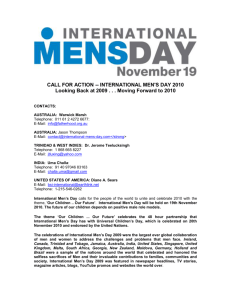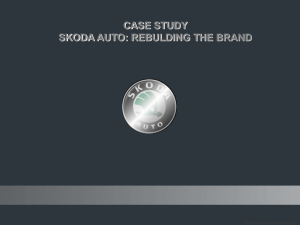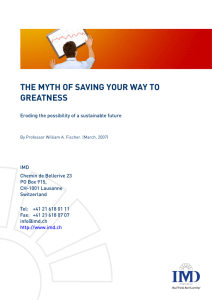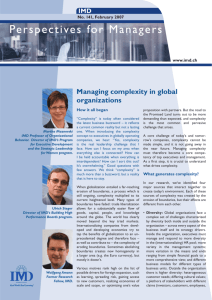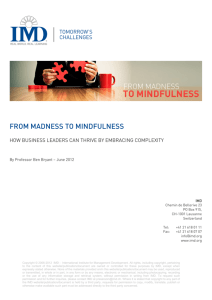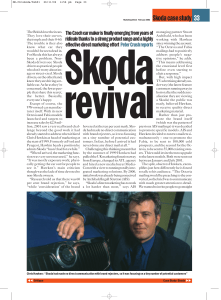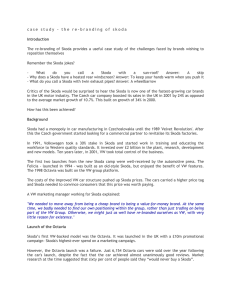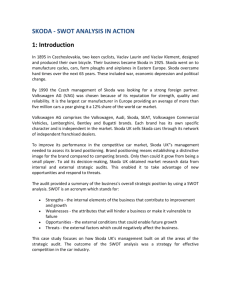from industry joke to serious competitor
advertisement
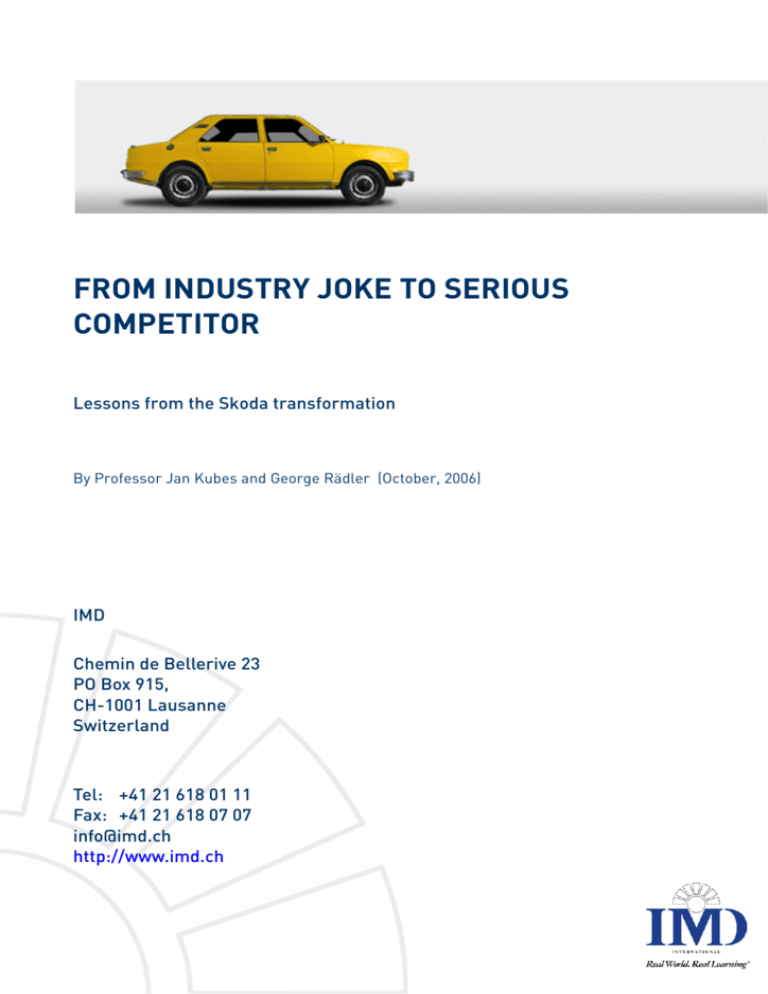
FROM INDUSTRY JOKE TO SERIOUS COMPETITOR Lessons from the Skoda transformation By Professor Jan Kubes and George Rädler (October, 2006) IMD Chemin de Bellerive 23 PO Box 915, CH-1001 Lausanne Switzerland Tel: +41 21 618 01 11 Fax: +41 21 618 07 07 info@imd.ch http://www.imd.ch FROM INDUSTRY JOKE TO SERIOUS COMPETITOR | Lessons from the Skoda transformation Quality, transfer of know-how, value-for-money, timing and speed were the key factors in the total transformation of the Czech-based car manufacturer Skoda from an industry joke to highly respected competitor. After acquiring an initial stake in Skoda of 30% in 1991, Volkswagen (VW) raised its investment gradually, improved the product range and geographic coverage, as well as organizing a real knowledge transfer between both companies. In 2000 VW took full ownership of the company. By 2005 Skoda was exporting 85% of its production. Skoda cars were sold in more than 85 countries (up from 30 in 1991), and the firm had more than doubled its net income to €260 million. Skodas were positioned as good value for money. The cars were positioned in between traditional segments in order to reach a wider audience. Between 2000 and 2005, the company won over 30 first prizes in car ratings in both Western and Eastern Europe. From no-class to world-class The case of Skoda demonstrates a successful transformation. Skoda regained its standing in the global automotive industry, and went from being the industry joke to a serious competitor. Even in this difficult sector with high capital intensity, long product lifecycles, long lead-times in development and production, Skoda was able to become a world-class operation. This was done by addressing three themes: 1. What was competition doing? Who were the major competitors? How did they compete? How did they differentiate their product offering? 2. How should the company respond: What were the strategic alternatives? Where was Skoda going to compete? What did the product/service offering look like? What segments would they serve? Was there a clear understanding of the business system/value chain? 3. How should the company align its software to support the transformation? How about company culture and style? Did the firm have the right systems and the right resources? IMD - www.imd.ch FROM INDUSTRY JOKE TO SERIOUS COMPETITOR Page 2/5 FROM INDUSTRY JOKE TO SERIOUS COMPETITOR | Lessons from the Skoda transformation Key success factors of the transformation At Skoda the transformation was driven by some key management principles: A quality drive that put the manufacturer back on the shopping lists of consumers. Quality was the number one objective. This was understood from the board to the shop floor. A value proposition around value-for-money in the minds of consumers helped Skoda to overcome massive disadvantages owing to its negative brand perception. Timing and Speed: Given the long product lifecycles in this industry, it made sense to improve the quality of the re-launched Felicia model (easy wins) before introducing new models (starting in 1997). Facilities were gradually upgraded. The ability to learn The ability to learn is one of the most important skills for latecomers in global markets. In the case of Skoda, knowledge sharing and learning was institutionalized: Within Skoda, there was a culture of trust and commitment and a thorough communication process with VW's HQ facilitating the flow of information. VW successfully transferred production, product and marketing know-how. Right from the start, VW sent key employees and set them up in tandem in order to exchange information continuously. Important links to stakeholders/decision makers In volatile/emerging markets, it is important to be linked to various stakeholders/decision makers. Skoda achieved this by: − Having members of the Czech government on the board helped Skoda's management to get buy-in. − Active involvement in industry associations as a sensing tool. − Visibility in the community by investing in sponsorship. IMD - www.imd.ch FROM INDUSTRY JOKE TO SERIOUS COMPETITOR Page 3/5 FROM INDUSTRY JOKE TO SERIOUS COMPETITOR | Lessons from the Skoda transformation Skoda's results were driven by the attention paid to these key themes and success factors that helped the management to pull off this impressive transformation. Further information is available on this from IMD on two of their case studies on Skoda Auto. Jan Kubes is Professor of Strategy at IMD and Director of the International Consulting Projects. He is Co-Director of Orchestrating Winning Performance, IMD's six-day flagship management program. Before joining IMD, he was a Partner at McKinsey. George Rädler is a Research Associate at IMD. He specialises in the automotive industry and is the author of numerous case studies. raedler@imd.ch. IMD - www.imd.ch FROM INDUSTRY JOKE TO SERIOUS COMPETITOR Page 4/5 FROM INDUSTRY JOKE TO SERIOUS COMPETITOR | Lessons from the Skoda transformation RELATED PROGRAMS ORCHESTRATING WINNING PERFORMANCE - http://www.imd.ch/owp The 6-day global business program - The fastest way to bring yourself up to date and stay ahead Program Directors Peter Lorange, Bettina Buechel and Dominique Turpin - For individuals and teams who seek the latest management thinking and practical, innovative solutions for their business - A unique energizer: boost your performance, broaden your perspectives and expand your global network - Network and design the program that suits you THE IMD MBA - http://www.imd.ch/mba Focus on Creative Leadership - Developing Leaders Who Make the Difference Program Director Benoît Leleux - Add to your management talent by hiring experienced IMD MBA graduates ready to contribute to your business - Develop your future corporate leaders in this leading edge, small, intense, 11-month international program focused on leadership - Gain new insights on your strategic issues from MBA teams in International Consulting Projects (ICPs) IMD - www.imd.ch FROM INDUSTRY JOKE TO SERIOUS COMPETITOR Page 5/5

